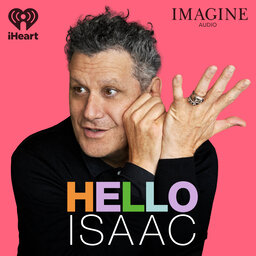Canine Cognition with Dr. Alexandra Horowitz
Isaac Mizrahi chats with Alexandra Horowitz about kids vs. dogs, how puppy therapy can translate to couples therapy and more.
Follow Hello Isaac on @helloisaacpodcast on Instagram and TikTok, Isaac @imisaacmizrahi on Instagram and TikTok and Alexandra Horowitz on Instagram @alexandrahorowitz.
(Recorded on July 26, 2023)
 Hello Isaac with Isaac Mizrahi
Hello Isaac with Isaac Mizrahi


